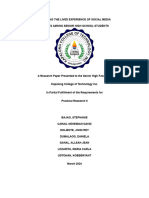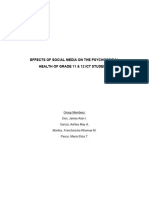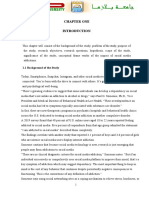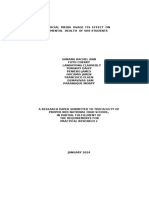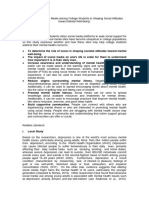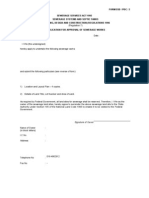0 ratings0% found this document useful (0 votes)
54 viewsChapter 2
Chapter 2
Uploaded by
nadinebayransamonte02The document reviews literature investigating the correlation between social media usage (Facebook, Instagram, TikTok) and anxiety levels in junior high school students. Several studies found positive correlations between social media addiction and social anxiety/negative impacts on happiness, sleep quality, depression and self-esteem. Excessive social media use was found to exacerbate anxiety and negatively impact mental health in adolescents. The literature demonstrates that increased social media usage is consistently correlated with higher anxiety levels in junior high school students.
Copyright:
© All Rights Reserved
Available Formats
Download as DOCX, PDF, TXT or read online from Scribd
Chapter 2
Chapter 2
Uploaded by
nadinebayransamonte020 ratings0% found this document useful (0 votes)
54 views7 pagesThe document reviews literature investigating the correlation between social media usage (Facebook, Instagram, TikTok) and anxiety levels in junior high school students. Several studies found positive correlations between social media addiction and social anxiety/negative impacts on happiness, sleep quality, depression and self-esteem. Excessive social media use was found to exacerbate anxiety and negatively impact mental health in adolescents. The literature demonstrates that increased social media usage is consistently correlated with higher anxiety levels in junior high school students.
Original Title
CHAPTER 2
Copyright
© © All Rights Reserved
Available Formats
DOCX, PDF, TXT or read online from Scribd
Share this document
Did you find this document useful?
Is this content inappropriate?
The document reviews literature investigating the correlation between social media usage (Facebook, Instagram, TikTok) and anxiety levels in junior high school students. Several studies found positive correlations between social media addiction and social anxiety/negative impacts on happiness, sleep quality, depression and self-esteem. Excessive social media use was found to exacerbate anxiety and negatively impact mental health in adolescents. The literature demonstrates that increased social media usage is consistently correlated with higher anxiety levels in junior high school students.
Copyright:
© All Rights Reserved
Available Formats
Download as DOCX, PDF, TXT or read online from Scribd
Download as docx, pdf, or txt
0 ratings0% found this document useful (0 votes)
54 views7 pagesChapter 2
Chapter 2
Uploaded by
nadinebayransamonte02The document reviews literature investigating the correlation between social media usage (Facebook, Instagram, TikTok) and anxiety levels in junior high school students. Several studies found positive correlations between social media addiction and social anxiety/negative impacts on happiness, sleep quality, depression and self-esteem. Excessive social media use was found to exacerbate anxiety and negatively impact mental health in adolescents. The literature demonstrates that increased social media usage is consistently correlated with higher anxiety levels in junior high school students.
Copyright:
© All Rights Reserved
Available Formats
Download as DOCX, PDF, TXT or read online from Scribd
Download as docx, pdf, or txt
You are on page 1of 7
Investigating the Correlation Between Facebook Instagram,
TikTok Usage and Anxiety Levels
in Junior High School
Students.
CHAPTER 2
FOREIGN LITERATURE
(International journal of progressive education v15 n4 p73-
82;2019)
"Social media addiction and social anxiety"
Pearson Correlation and Hierarchical Regression analysis were
conduct in SPSS to investigate the Correlation between media
addiction and their social anxiety, Happiness and loneliness
levels. On the other hand, there was a negative relationship
between student’s social media addiction levels and their
happiness levels. according to this social media addiction
variable significantly predicted by the social anxiety and
happiness variable but it did not significantly Predicted by
loneliness variable.
(Journal of Adolescence 51,41-49,2018)
"Social Media use in Adolescence”
Social media sites such as Facebook and Twitter have rapidly
become a centrals part of young people's lives, with over 90% now
using social media day and night. evidence is increasingly
supporting a link between social media use and various aspects of
adolescent wellbeing, including sleep and mental health social
media use and emotional investment in social media relate to
sleep quality, anxiety, depression and self-esteem in adolescent.
(Chang Liu, Tian ling Ma Current psychology 39(6),2020)
"Social Media Addiction and burnout"
Chinese university students completed self-report questionnaires
on social media addiction. social media burnout, envy, and social
media use anxiety. More over. Envy and social media use anxiety
mediated the relationship between social media addiction and
burnout. Both in parallel and as a pair in series.
(Australian Journalism reviews 39(2),6777,2018)
"Digital media and models of bio community ability in mental
health journalism"/
This article explores someways which digital and social media are
potentially impacting health journalism, with particular
attention to a series of interviews with Australian Journalists
about their experiences when reporting on Mental health issues.
in particular the article engages the question of how digital
media may work to enable and constrain biomedical authority,
patient consumer and public sphere orientation to health
journalism.
(Journal of medical internet research 15(4), ela33,2018)
"Benefits and limitations of social media for health
communication"
Social media brings a new dimension to health care as it offers a
medium to be used by the public, patients, and health
professionals to communicate about health outcomes. social media
is a powerful tool, which offers collaboration between users and
is a social interaction mechanism for a range of individuals.
LOCAL LITERATURE
(Dalmacito A. Cordero (Journal of men's health 17,(2).2023)
"Social media detrimental effects on mental health is online
pornography."
In a recent letter published in this Journals the author
interestingly pointed out that during the covid-19 pandemic when
there were lockdowns and restrictions many Filipinos resorted to
online engagement to connect with their family and friends
utilizing social media, they organized online Inu man or "e-num
an" where they meet up over bottles of wine or
beer(macaraan,2022). while online Inu man and social media. Play
an important role as coping mechanism another virtual Elements
that needs balancing regulation or even avoidance because of its
detrimental effect on mental health is online pornography.
(common sense media,2021(page 2-4)
"Social media's effect on teens"
Social media effects on teens, about half of the 1,500 young
people surveyed said social media is very important for them in
order to get support and advice, feel less alone, and express
themselves creatively as well as for staying in touch friends and
family while social distancing.
(International journal of psychology and counseling)
(volume 11, Number 3(2021). pp.98- 112)
“Depression caused by social media”
Social media use has become prevalent and nearly inevitable
changing the way students interact, connect and socialize it has
become an integral part of the social and cultural fabric.as a
result, students spend a significant amount of the time on social
media students will feel more pressure because of the likes they
achieving. they added that comparing their result with other who
will not be satisfied with the outcome will be move likely to
cause depression among going people.
(PubMed central 2021, apr ; 28(4): 2216-2222)
Social media impact on student mental health
Social media has an impact on student mental health which refers
to their emotional, psychological and social wellbeing. media
use has negative effects on mental health and call lead to
depression and anxiety. social networking sites and application
are widely used by student they spend a lot of their time on
these sites as a part of their daily lives.
(St. Cabrini journal of Allied Medicine, 2019. p.1-2)
“Social media use and perceived depression of college students.”
Facebook still is the most popular social media platform site
among this population group. most of the students do not show
evidence of perceived depression despite the number of Engagement
in social media platform.
REVIEW OF LITERATURE
Social media has become an integral part of the lives of
junior high school students with over 90% now using social media
on a daily basis. however, growing evidence suggests that social
media use may have negative consequences for adolescent mental
including increase anxiety levels. this review literature aims to
investigate the correlation between social media usage and
anxiety levels of junior high school student.
(Social cognitive theory) this theory suggests that
individuals learn from observing, imitating, and modeling
behaviors they see in their environment. in the context of social
media, students may experience anxiety as they compare themselves
to idealized images and behaviors displayed on these platforms
affecting their self-esteem and over all wellbeing.
(Cultivation theory) exposure to certain content overtime
can shape an individual perception of reality students who spend
more time on social media platforms might cultivate perceptions
of a world filled with unrealistic standards and expectations,
potentially contributing to anxiety.
Several journal/studies have explored the relationship
between social media usage and anxiety levels in adolescents. a
study published in the (international journal of progressive
education 2019)found a positive correlation between student
social media addiction and their social anxiety levels.
additionally, the study found a negative correlation between
student social media addiction levels and their happiness levels.
these findings suggest that excessive social media use may
exacerbate anxiety and reduce happiness in junior high school
students.
Another study, published in the (journal of adolescence
2019) found that social media use in adolescence is associated
with sleep quality, anxiety, depression and self-esteem.
especially the study found that emotional investment in social
media was associated with poorer sleep quality higher levels of
anxiety and depression, and lower self-esteem. these findings.
Furthers, support the motion that excessive social media use can
have detrimental effects on adolescent mental health.
The reviewed studies consistently demonstrate a positive
correlation between social media usage and anxiety levels of
junior high school student. excessive social media use may
exacerbate anxiety, reduce happiness, and negatively impact sleep
quality, depression and self-esteem. additionally, envy and
social media use anxiety may play a role in the negative effects
of social media addiction on mental health.
CITATION
Foreign:
"International journal of progressive education (2019)
social media addiction and social anxiety."(p. 73-82)
Duggan and smith 2018) social media use in adolescence."(p.
41-49)
"Chang Liu and Jian ling ma (2020) social media addiction
and burnout." (p. 1883-1891)
"Kate holland (2018) digital media and models of bio
communicability in mental health journalism." (p. 67-77)
"Anne Moorhead, Laura Hartison, Jennifer Karoli (2018)
benefits and limitations of social media for health
communication." (p-e1933)
Local:
Cordera, Damacio (2023) social media detrimental effects on
mental health is online pornography."(p.2)
commonsense media (2021) social media's effect on teen."(p.
2-4)
international journal of psychology and counseling (2021)
depression caused by social media."(vol.11, (3),p.98-112)
Pub Med central (2021) social media impact on student mental
health."(p.2216-2222)
St. Cabrini journal of allied medicine (2019) social media used
and perceived depression of college students."(p.1-2)
You might also like
- La Rebelde by Leonor Villegas de MagnonDocument305 pagesLa Rebelde by Leonor Villegas de MagnonArte Público Press100% (8)
- Effects of Social Media On Mental Health: A Case StudyDocument12 pagesEffects of Social Media On Mental Health: A Case StudyTialena Evans100% (3)
- Employer Nomination Scheme Visa (Subclass 186) Direct Entry StreamDocument14 pagesEmployer Nomination Scheme Visa (Subclass 186) Direct Entry StreamEdmil PabellanoNo ratings yet
- Impact of Social Media On Mental Health of Students: AbstractDocument6 pagesImpact of Social Media On Mental Health of Students: AbstractAN G EL0% (1)
- Tirman, John - The Deaths of Others - The Fate of Civilians in America's Wars (2015, Oxford University Press)Document417 pagesTirman, John - The Deaths of Others - The Fate of Civilians in America's Wars (2015, Oxford University Press)Engb KmNo ratings yet
- Chapter TwoDocument2 pagesChapter TwoizzullbarbersshopNo ratings yet
- G11 Obedience - Lozarita ResearchDocument11 pagesG11 Obedience - Lozarita ResearchCarlo Dennis LozaritaNo ratings yet
- The Impact of Using Social Media On Mental Health Among Students in The Stem Strand A Title Proposal 1Document14 pagesThe Impact of Using Social Media On Mental Health Among Students in The Stem Strand A Title Proposal 1eizabethbalangueNo ratings yet
- RRLRRS1Document7 pagesRRLRRS1chloetuarez660No ratings yet
- EXPLORING THE I-WPS OfficeDocument7 pagesEXPLORING THE I-WPS Officewmatci elmaNo ratings yet
- Essay 1 1302Document6 pagesEssay 1 1302api-709320829No ratings yet
- Nya Dean JOMC 303-03A May 30, 2021Document7 pagesNya Dean JOMC 303-03A May 30, 2021Nya DeanNo ratings yet
- Final Proposal 2Document10 pagesFinal Proposal 2shabinarana342No ratings yet
- Chapter IiDocument6 pagesChapter IilanreharlenNo ratings yet
- Effects of Social Media On The Psychosocial Health of Grade 11 12 Ict StudentDocument24 pagesEffects of Social Media On The Psychosocial Health of Grade 11 12 Ict StudentFranchescka Rhomae MontesNo ratings yet
- Effects of Social Media On One's Mental HealthDocument5 pagesEffects of Social Media On One's Mental HealthJohnLloyd ClaveriaNo ratings yet
- New 14 2Document12 pagesNew 14 2AdrianPaul Artiola100% (1)
- Concept Paper - AnulaoDocument9 pagesConcept Paper - AnulaoLance AnulaoNo ratings yet
- Research Analysis Essay CorrectedDocument7 pagesResearch Analysis Essay Correctedapi-745590622No ratings yet
- Chapter - 1 The Problem and Its BackgroundDocument13 pagesChapter - 1 The Problem and Its BackgroundJESSEAL SANTIAGONo ratings yet
- Presentation 1Document11 pagesPresentation 1musman00880No ratings yet
- The Impact of Social Media On IndividualsDocument9 pagesThe Impact of Social Media On Individualsshanawaz sheikhNo ratings yet
- Impact of Social Media On Mental Health of StudentsDocument5 pagesImpact of Social Media On Mental Health of StudentsNelgine GepuitNo ratings yet
- Annotated Bibliography 2Document7 pagesAnnotated Bibliography 2api-709186786No ratings yet
- Practical Research 2 AtobaoDocument2 pagesPractical Research 2 AtobaoJose Manuel AgasNo ratings yet
- Impact of Social Media in The Incidence of Depression Among Senior High Students"Document15 pagesImpact of Social Media in The Incidence of Depression Among Senior High Students"jamaikie ramosNo ratings yet
- The Danger Behind Social Media: Relationship of Social Media Use and Anxiety Among Emerging AdultsDocument32 pagesThe Danger Behind Social Media: Relationship of Social Media Use and Anxiety Among Emerging AdultsFaatoots Fats50% (2)
- FinalDocument18 pagesFinalapi-530135653No ratings yet
- Research PaperDocument9 pagesResearch PaperjudyanngaveroannNo ratings yet
- Edited ResearchDocument11 pagesEdited ResearchAl LinaresNo ratings yet
- An Bib DrafttDocument7 pagesAn Bib Drafttapi-709320829No ratings yet
- Essay 3 Final Eng1302Document6 pagesEssay 3 Final Eng1302api-708111083No ratings yet
- Self Disclosure On Social MediaDocument24 pagesSelf Disclosure On Social MediaSaleemah MuhammadNo ratings yet
- Unit 4 Synthesis Essay - Maher-Ali DhananiDocument5 pagesUnit 4 Synthesis Essay - Maher-Ali DhananiMaher-Ali DhananiNo ratings yet
- Research Paper Social Media and Mental Health Among Univeristy StudentdsDocument12 pagesResearch Paper Social Media and Mental Health Among Univeristy StudentdsShyNo ratings yet
- Effective of Sociap MediaDocument9 pagesEffective of Sociap MediaMohamed HussienNo ratings yet
- Articles STSDocument5 pagesArticles STSShane CompayanNo ratings yet
- Chapter Two Review of Related Literature and Conceptual FrameworkDocument6 pagesChapter Two Review of Related Literature and Conceptual FrameworkJohn Pol Hinlog CustadoNo ratings yet
- Emotion Analysis of Social Media Content For Mental HealthDocument17 pagesEmotion Analysis of Social Media Content For Mental HealthAhmed DridiNo ratings yet
- Ensayo - El Impacto de Las Redes Sociales en Los JóvenesDocument4 pagesEnsayo - El Impacto de Las Redes Sociales en Los JóvenesLaura RodriguezNo ratings yet
- Social MediaDocument9 pagesSocial MediaMohamed HussienNo ratings yet
- Social Media Use Its Effect OnDocument25 pagesSocial Media Use Its Effect OnJohn Philip MalonesNo ratings yet
- Impact of Social Media Culture To High School StudentsDocument4 pagesImpact of Social Media Culture To High School StudentsAngeline Lagman AquiNo ratings yet
- RRL Jeyssa YermoDocument8 pagesRRL Jeyssa YermoJeyssa YermoNo ratings yet
- Practical Research 2 (Autorecovered)Document32 pagesPractical Research 2 (Autorecovered)gabrielcatan954No ratings yet
- Influence of Social Media On Educational and Mental Wellbeing of Young Minds: A Critical AnalysisDocument7 pagesInfluence of Social Media On Educational and Mental Wellbeing of Young Minds: A Critical Analysisalthealorraine.marcial.mnlNo ratings yet
- The Role of Social Media Among College StudentsDocument3 pagesThe Role of Social Media Among College StudentsTherese Melchie SantuyoNo ratings yet
- Effects of Social Media On Mental Health of Todays YouthDocument16 pagesEffects of Social Media On Mental Health of Todays YouthShubham Yadav100% (2)
- Molina and Rojas 074Document9 pagesMolina and Rojas 074Đỗ Quang HuyNo ratings yet
- PR 2 DimpleDocument13 pagesPR 2 DimpleAnjelica Bu-ucanNo ratings yet
- Relationship Between Social Media Use and Social Anxiety Among emDocument17 pagesRelationship Between Social Media Use and Social Anxiety Among emMagali DominguezNo ratings yet
- RRL 6pagesDocument6 pagesRRL 6pagesChristian VillaNo ratings yet
- Mental Health and Social Media, A Double-Edged SwordDocument4 pagesMental Health and Social Media, A Double-Edged Swordfm4078150No ratings yet
- A Review of Related Literature and StudiesDocument4 pagesA Review of Related Literature and StudiesJean Jean Orogo100% (2)
- Research Paper 1Document1 pageResearch Paper 1shaoordogar762No ratings yet
- Annotated BibliographyDocument7 pagesAnnotated Bibliographyapi-548615782No ratings yet
- The Effects of Social Media Platforms To The Mental Health of Grade 10 Students Amidst PandemicDocument16 pagesThe Effects of Social Media Platforms To The Mental Health of Grade 10 Students Amidst Pandemicstanley jones tugasNo ratings yet
- Review Related Literature: Group 4 - Im22Document10 pagesReview Related Literature: Group 4 - Im22Kaye CutamoraNo ratings yet
- Social Research StudyDocument18 pagesSocial Research StudyAli RungeNo ratings yet
- Annotated Bib - Revised EssayDocument10 pagesAnnotated Bib - Revised Essayapi-740505368No ratings yet
- Final Paper Impressions of SHS Towards Social Media Group7Document26 pagesFinal Paper Impressions of SHS Towards Social Media Group7Lander SeguerraNo ratings yet
- NJP 2024 Abamaranc PREVALENCE OF SOCIAL MEDIA ADDICTION 1Document7 pagesNJP 2024 Abamaranc PREVALENCE OF SOCIAL MEDIA ADDICTION 1Karkar ONo ratings yet
- MCD ProcessDocument4 pagesMCD Processapi-505775092No ratings yet
- Francis A Sahali Research ReportDocument46 pagesFrancis A Sahali Research ReportElizabeth CharlesNo ratings yet
- Actual Pilling RefineryDocument1 pageActual Pilling Refineryadeliastudio25No ratings yet
- Mr. Know AllDocument18 pagesMr. Know AllSai GokulNo ratings yet
- MCQ - Human Resources Management - 0Document20 pagesMCQ - Human Resources Management - 0DRISYANo ratings yet
- Fallacy of Subjectivity:: ExamplesDocument2 pagesFallacy of Subjectivity:: ExamplesKaustav MannaNo ratings yet
- A. MODIGLIANI-Les Mariés RVDocument3 pagesA. MODIGLIANI-Les Mariés RVstonecoldltdNo ratings yet
- Endpoint Hardening Checklist 1682068842Document10 pagesEndpoint Hardening Checklist 16820688428dhcyj7gtmNo ratings yet
- GEC97-Detailed Guidelines PDFDocument223 pagesGEC97-Detailed Guidelines PDFpadamNo ratings yet
- "Automation of District Courts (East & West) of Ict, IslamabadDocument3 pages"Automation of District Courts (East & West) of Ict, IslamabadRaja AhsanNo ratings yet
- AnimalDocument27 pagesAnimaljessalyn iladaNo ratings yet
- Session 6 FINANCIAL PLANNING Working Capital ManagementDocument44 pagesSession 6 FINANCIAL PLANNING Working Capital ManagementXia AlliaNo ratings yet
- Lacson vs. Executive Secretary G.R. No. 128096Document2 pagesLacson vs. Executive Secretary G.R. No. 128096Manar H. MacapodiNo ratings yet
- Nouns. Noun PhrasesDocument3 pagesNouns. Noun Phrasesvitalii.rozhuk.fl.2020No ratings yet
- PDC 2Document6 pagesPDC 2Mageswary KunalanNo ratings yet
- List of Schools in BangladeshDocument2 pagesList of Schools in Bangladeshapi-330520534No ratings yet
- CBSE Yoga Quiz-2021Document2 pagesCBSE Yoga Quiz-2021Satvik MohantyNo ratings yet
- The NCS Report - Kalamazoo, MI 2021Document101 pagesThe NCS Report - Kalamazoo, MI 2021Hannah MichelleNo ratings yet
- Team e SinopeDocument29 pagesTeam e SinopeJulia Grace UmaliNo ratings yet
- Warrant of Arrest Information and ChargeDocument36 pagesWarrant of Arrest Information and ChargeSheila SharonNo ratings yet
- Sack Potato Farming - A Dream Come True in HarareDocument2 pagesSack Potato Farming - A Dream Come True in HarareCoulNo ratings yet
- ITF - SIWES Report Sheet - 1584379696Document2 pagesITF - SIWES Report Sheet - 1584379696Animonga HajimeNo ratings yet
- Certificate Course in Psychology 2024Document4 pagesCertificate Course in Psychology 2024taste.veetusapaaduNo ratings yet
- IDSE Exhibitor Manual 2023Document16 pagesIDSE Exhibitor Manual 2023fathabNo ratings yet
- Essays For KidsDocument5 pagesEssays For Kidsf1silylymef2100% (2)
- ADLER, Joseph - The Confucian Body AdlerDocument9 pagesADLER, Joseph - The Confucian Body AdlerCarolyn HardyNo ratings yet
- Policy Guidelines On Daily Lesson Preparation For The K To 12 Basic Education Program June 17, 2016Document11 pagesPolicy Guidelines On Daily Lesson Preparation For The K To 12 Basic Education Program June 17, 2016Shakira Isabel ArtuzNo ratings yet







